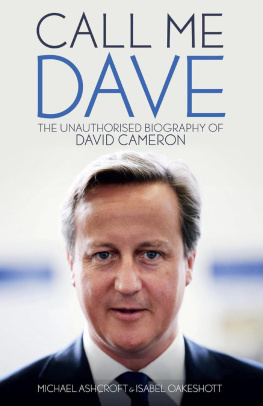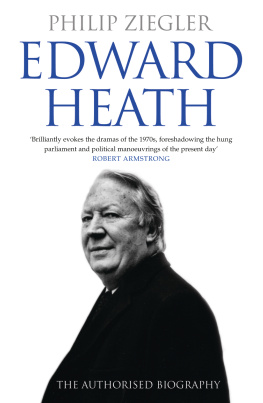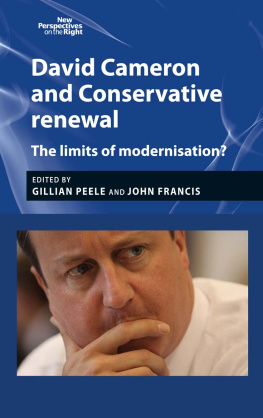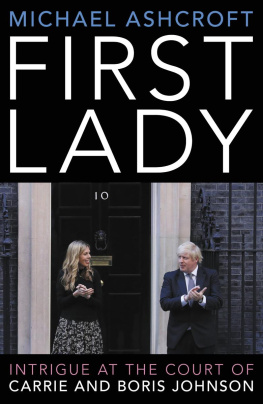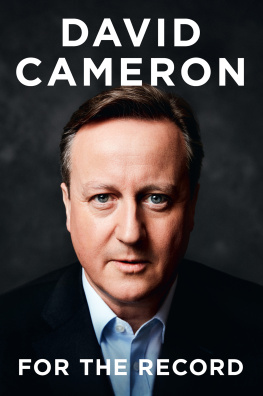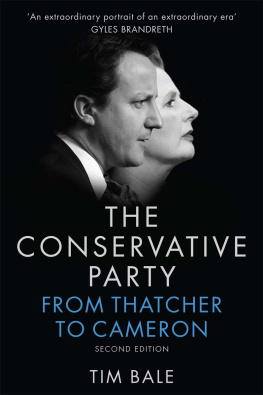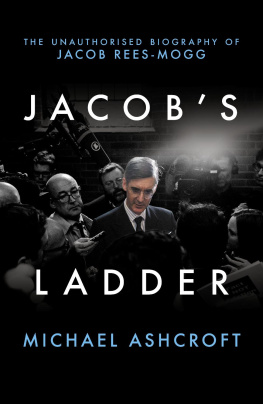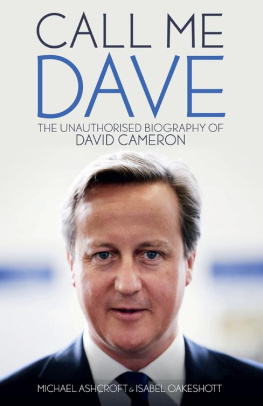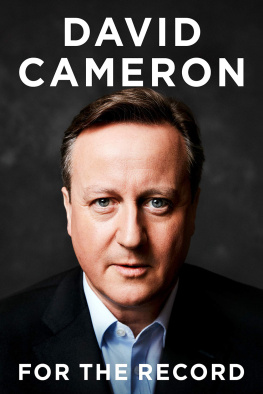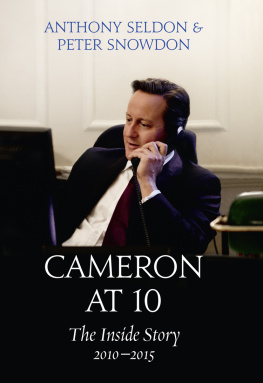
C ONTENTS
P REFACE
by Michael Ashcroft
I first met David Cameron in 2005 when he was running for the party leadership and I was on the Conservative Party board. He came to see me in my office near the Houses of Parliament and we had a brief discussion about the many challenges the party faced and how he thought he could make the changes needed to win in 2010. I was impressed: he presented a good case, and I found him refreshing. I was unsure whether he was ready to lead the party, but there was no doubt in my mind that his time would come. Being on the board, I had to remain neutral in the contest.
Shortly after his victory in late 2005, Cameron asked to see me again. He had read Smell the Coffee , my account of the Conservative Partys predicament, which I had published after that years general election, at which the Tories had suffered their third consecutive defeat. My analysis, which was based on extensive polling and focus group research, led me to two major conclusions: that the party needed to be more focused and disciplined in the way it targeted its campaigning resources in marginal seats; and that it had to grasp how it had come to be seen by voters who ought to have been its supporters. Cameron was keen to bring these lessons to bear. Accordingly, he asked me to become deputy chairman of the party with responsibility for its private research and the target seat operation, ensuring the ground campaign was directed at the right people, in the right places, with the right message.
I was delighted to accept the role, though I was keen to retain some distance from Central Office, and continued to be based in Cowley Street. I was supported by Stephen Gilbert, who subsequently went to Downing Street as Camerons political secretary, and Gavin Barwell, who became the MP for Croydon Central and was appointed a senior government whip. Together we carried out political research for the party until 2010, with a particular focus on fighting the target seats. The aim was to identify key issues for voters in these constituencies to ensure we were developing and delivering the most effective policies and messages.
As the 2010 election drew closer, Cameron asked me to move my operation into party headquarters, a request which gave me some concern. I knew it would put me in the firing line. Part of my job was to unseat Labour and Liberal Democrat MPs, and I felt that if I were formally established in Central Office, I would come under increasing attack. I am well used to the scrutiny that goes with my public profile, but I did not relish the prospect of attracting more hostile attention to myself or my businesses.
I had a number of conversations with Cameron about the proposed move, and it was during one of these discussions that I believe we agreed the type of role that I would play were he to become Prime Minister. I made full and contemporaneous notes of our discussion, but it would later transpire that our understandings of what had been agreed in principle were different. This book is not the place to reveal more of that conversation, which I will detail in my eventual autobiography. Suffice to say that my uneasy relationship with Cameron since 2010 dates back to the undertaking I believe he made during this exchange. I could not help but reflect on a comment made to me by a shadow Cabinet minister in the run-up to the 2010 election that Camerons word is as good as the paper its written on.
Encouraged by the prospect of participating in a Cameron government, I agreed to move into 30 Millbank for the remainder of the 2010 campaign. Despite my reservations, I accepted the logic of bringing the team under one roof. Just as I predicted, in the months that followed, I found myself under increasingly hostile gaze from elements of the Liberal Democrat and Labour Parties, particularly over my tax status in relation to my membership of the House of Lords. This had long been a source of interest to the media, and I knew that as the election drew nearer, there would be renewed pressure on me.
Well before that happened, in 2009, I discussed the matter in detail with Cameron. As a result of these conversations, he was fully aware of my status as a so-called non dom, the rule that allows some wealthy UK residents to limit the tax they pay on earnings outside the country. Indeed, we had a conversation about how we could delay revealing my tax arrangements until after the election. In the event, this proved difficult, because of Labours enquiries under freedom of information legislation, but nothing that emerged in March 2010 was a surprise to him. The media furore was unpleasant, but I knew it would blow over, and looked forward to being part of Camerons administration if we won in 2010.
Once he became Prime Minister I waited, as many do, for the telephone call. After hearing nothing for a couple of days, I spoke to Andrew Feldman, who was co-chairman of the party. Shortly afterwards Cameron called me, to thank me profusely for all the work that I had done. I thanked him in turn and asked what my next role would be. There was silence at the end of the phone.
Ah, its difficult, he replied awkwardly. We probably need to have another conversation.
He left me hanging. On the second Sunday after he became Prime Minister, he invited me to a family lunch at Chequers. He took me for a walk in the garden, and told me that when appointing the coalition ministers, Liberal Democrat leader Nick Clegg had vetoed any appointment for me. Recently, after he stepped down as leader of the Liberal Democrats, we checked this version of events with his office: Clegg said he had no recollection of having barred any Conservative appointments.
Still, Camerons conscience must have pricked him a little, because a short while later, I did get an offer. The role he had in mind was to be a junior whip in the Foreign Office. After putting my neck on the line for nearly ten years, both as party treasurer under William Hague between 1998 and 2001 and as deputy chairman between 2005 and 2010, and after ploughing some 8 million into the party, I regarded this as a declinable offer. It would have been better had he offered me nothing at all.
Despite this, and whatever my private feelings, I had no desire to embarrass him and resolved not to tell anybody about the matter. I did not speak a word of it throughout the coalition. I do so now only to explain why our relationship has been somewhat strained since 2010, a situation that is no secret at Westminster.
Even so, I am proud of the two assignments I have completed at Camerons request since 2010: a strategic review of Britains sovereign military bases in Cyprus, and the Veterans Transition Review , which examined the provision for those leaving the forces and returning to civilian life. In both cases my main recommendations were accepted and I am glad to have been able to make a contribution in these important fields.
Despite the disappointments I have described, I want to be clear about my motivation for writing this book, which however sorry I remain about what happened is not about settling scores. I do not feature in the narrative at all, because I wanted to tell Camerons life story, not mine. My role in the party while he was Leader of the Opposition will be kept for another day.
I had always planned to produce an analysis of the 2015 election, as I did with Smell the Coffee and Minority Verdict after the elections of 2005 and 2010 respectively. My detailed political analysis of the parliament, based on my polling work since the formation of the coalition government, appears in the appendix to this book. When this project was conceived, it seemed possible that the outcome of the 2015 election would mark the end of Camerons tenure at Downing Street. As the existing biography of the Prime Minister by Francis Elliott and James Hanning was primarily written in 2007, it seemed timely to produce a new one. I was anxious that such a book be objective, and so I asked Isabel Oakeshott, then political editor of the Sunday Times , to co-author the work.
Next page
